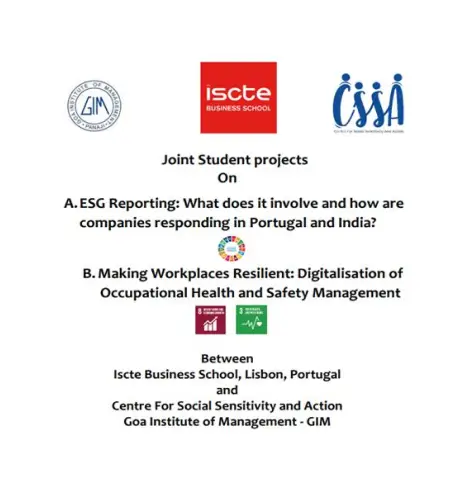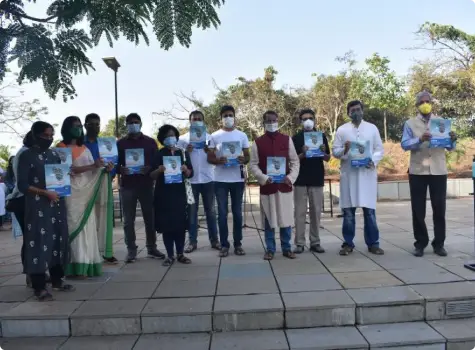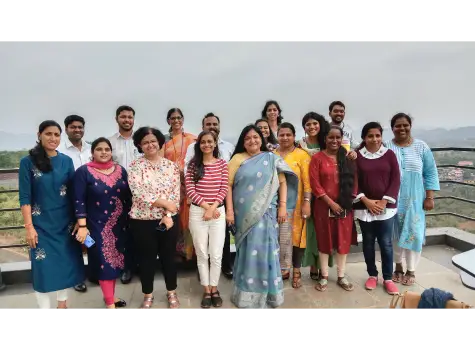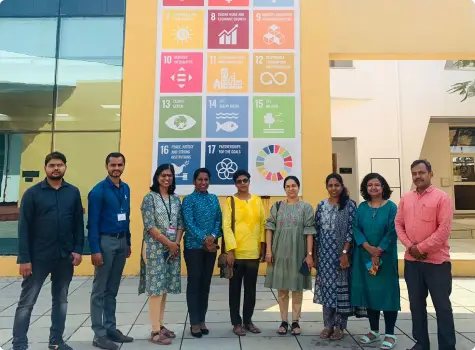Build capacities of students and professionals

SDG Innovation Accelerator for Young Professionals
The UN Global Compact SDG Innovation Accelerator engages young professionals from companies participating in the UN Global Compact around the world to learn how to use the Sustainable Development Goals (SDGs) as a catalyst for the development of new products and services. Building on the UN Global Compact’s work on Breakthrough Innovation for the SDGs, the accelerator connects mid-level and junior managers – aged 35 and younger – across diverse business units to generate bold yet viable solutions that can have a positive impact on the company
and the SDGs…………

Sustainability Challenge Report
The term ‘sustainability’ necessitates planet-friendly considerations in every decision, regardless of its impact’s size and scale. Emphasizing Sustainability’s importance to the new generation, especially future business leaders, is crucial. The global business and policy ecosystem aims to integrate sustainable practices to manage resources, promote inclusivity, and ensure profitability. At the Goa Institute of Management (GIM), the ‘Sustainability and Society’ course is mandatory for all first-year PGDM students. This course includes the ‘Sustainability Challenge’ project, which raises awareness about the 17 Sustainable Development Goals (SDGs) and encourages innovative sustainable practices. Highlighted in the PRME i5 viewbook, this cutting-edge pedagogy transforms students into active stakeholders and resource creators, preparing them for sustainable careers. Through such initiatives, GIM aims to shape responsible business leaders equipped to address future sustainability challenges.

Mitigating the Impact of Climate Change on HIV Response in India
This comprehensive report has been prepared with the objective to map the available evidences on impact on climate change on HIV responses and identify key research priorities through an evidence gap – map approach. Since the consequences of climate change on prevention and management of HIV is indirect and multifactorial, our efforts are limited by the scarcity of primary studies particularly in India. However, based on available global evidence certain important and cross cutting pathways have been identified such as Food Insecurity, Migration, Service and infrastructure disruption, mental health.
Summary Report Seminar Organisational Governance & Corporate Social Responsibility
Presenting the report of the seminar on “Organizational Governance & Corporate Social Responsibility (CSR)” held at the Goa Institute of Management (GIM), Sanquelim Campus, hosted by the Bureau of Indian Standards (BIS), New Delhi in association with the Centre for Social Sensitivity and Action (CSSA).The seminar was designed to delve into the intricate aspects of CSR and IS 26001:2024, exploring its legal framework, the role of academia in fostering social responsibility, and the impact of technology and emerging trends on CSR practices………


SUSTAINABILITY & DEVELOPMENT: ARE YOU READY TO RESPOND TO IT?
The study aims to understand the awareness and response to Sustainable Development Goals (SDGs) among Higher Education students in Goa. The idea of this study came from the discussions at the Goa Chamber of Commerce and Industry (GCCI) Education Committee meetings, and one of the PGDM Executive Program student group at the Goa Institute of Management (GIM) of the Business Research Method Course was entrusted to design and execute this study on a pilot basis.

Sahayog
Teaching SDGs Beyond Classroom. Sahayog aims to create sustainability ambassadors among students through collaborative projects with national and international institutions. The ultimate goal is to teach students the value of collaborative leadership and develop responsible, agile leaders for business. Sahayog comprises of short-term projects where students from GIM co-work with students from other national and international institutions on social and economic goals of Sustainable Development.
The projects carried out under the initiative were:
- Sustainable Fashion: Towards Reducing Social and Environmental Ill Effect· Responsible Workplaces: Documenting Good Practices on Inclusion and Diversity adopted by companies in India and Bangladesh
- Creating Social Impact Dashboard
- Circular Economy and Policy Recommendations
- ESG Reporting: Frameworks, Relevance and Challenges[DS4]
Give Goa
(this is an experiential course on social action with an aim to nurture responsible leadership among students through direct engagement with the community). Through Give Goa, students have had the opportunity to understand and experience grand societal challenges and utilise their management acumen towards creating a fair and equitable society[DS6] .


Doctoral Colloquium
The Center of Social Sensitivity and Action at the Goa
Institute of Management, announces a two-day Virtual Colloquium on Driving
Agenda 2030: Research for Societal and Business Sustainability
Management Development Program(MDP)
A 4 -day training program was organised by CSSA in Collaboration with Goa Livelihood Form on Nurturing Leader for Social Impact. The MDP was attended by 15 program managers. The program was designed to faciliate them enhance their leadership and communication skills; and gain knowledge about systems thinking and sustainability which will help them lead and drive positive impact at the level of organization and the community.


Training Program
A day long training program was organised by CSSA on Research Methodologies and Impactful Report Writing for Research Fellows from Chief Minister’s Fellowsip Programme,Government of Goa. The programme was designed to orient the fellows about Research Methods, Various Research Designs, Data Collection Methods, Data Analysis and Visualization techniques and Writing Impact Report. The Training Programme was sponsored by the Goa Institute of PublicAdministration and Rural Development (GIPARD) and was conducted at GIM Campus in Sanquelim .
Building capacities of students and professionals – We at CSSA offer opportunities to students (through collaborative projects/case study competitions) that enable them to be responsible leaders. One of our initiative ‘Sahayog’ comprises short-term projects where students from GIM co-work with students from other national and international institutions on social and economic goals of Sustainable Development.
We hope to encourage more such studstudent initiatives reinforce positive attitudes toward community and service and shape them into proactive citizens. . Development professionals need training to report on change or social impact. CSSA faculty conducts sessions on SDGs, Sustainability Reporting, Reporting on Social Impact for NGOs so that they can align their work with SDGs as well as be able to report impact of their initiatives, better.
For building capability among students, CSSA has adopted a two-pronged approach:
- Sensitising them about the social and environmental challenges facing society
- Offering opportunities to students (through collaborative projects/case study competition) to address grand challenges. We have designed and implemented various student projects on topics such as Sustainable Fashion, ESG, Diversity and inclusion. Many of these student projects have been done in collaboration with national and international partners. We hope to encourage more such student-initiatives, to reinforce positive attitudes toward community service and shape them into proactive citizens. . Development professionals need training to report on change or social impact. CSSA faculty conducts sessions on SDGs, Sustainability Reporting, Reporting on Social Impact for NGOs so that they can align their work with SDGs as well as be able to report impact of their initiatives, better.
“Towards a Compassionate World”
SEE learning is a universal curriculum, and its contents related to awareness, compassion, self-compassion, engagement, resilience, and system thinking could be taught and practiced by a diverse population. With that thought in mind, last year, in June 2022, we had a discussion with Prof. Ajit Parulekar, Director, of GIM. He encouraged us to introduce the SEE Learning module as part of the induction program of the incoming batch. Our discussion last year with SEE Learning India Team- Ms Reshma Piramal and Ms Neha Bhatia provided guidance and direction to us. With their support, GIM became the first management institute in the country to introduce this curriculum as a part of the induction program in 2022. This year, we followed the same approach and introduced the SEE Learning module during our induction for new students in June-July 2023

Lorem ipsum dolor sit amet, consectetur adipiscing elit. Ut elit tellus, luctus nec ullamcorper mattis, pulvinar dapibus leo.